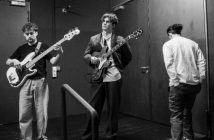With a new music biopic about Queen coming out in October that is sure to leave us wishing we could have been there to see Freddie Mercury in his prime, The Edge writers got to thinking about the musicians they wish they could have seen perform live. Being born a decade or two too late or through unforeseen circumstances, the universe had other plans – but our writers discuss the incomparable talent the universe lost when it let these people go.
Prince
If the phrase had been around in the ’80s I’m pretty sure my Mum would have been considered a Prince ‘stan’. She saw the pop legend in concert 5 times(!) and never lets me forget it; it’s safe to say I’m more than a little jealous.
On stage more than anywhere else Prince lived up to his self-assigned royal title: he commanded arenas, captivated audiences and shredded on guitar like Apollo on the lyre. He was just natural, never overtly choreographed, and oozed charisma. His most stunning quality as a performer, though, had to be his magnetism: Prince didn’t outwardly perform to audiences, he drew them to him.
The real salt in the wound has to be that my Mum didn’t even keep any of her Prince concert T shirts. I know, right? How can she call herself his biggest fan?! Nonetheless, I have to thank her: if she hadn’t introduced me to Prince’s music then I would have never heard a dove cry, I wouldn’t know a red corvette from a red Ferrari and rain would always just be clear – never purple.
https://www.youtube.com/watch?v=7NN3gsSf-Ys
Freddie Mercury
It’s not unusual that you hear people grumbling that they were ‘born in the wrong generation’, and that they want nothing more than to see their deceased icons up on stage. But with Freddie, it’s different. He should still be here. He was so ahead of his time with his experimental music, flamboyance and mesmerizing stage presence, so we can only imagine what spellbinding things he would achieve on the live music scene today.
From the live concert videos and tales from my gran, Freddie’s presence on stage was hypnotic. Before there was Lady Gaga’s meat dress or Madonna’s metal bra, there was Freddie in a full cape and crown, neon suits or that iconic yellow jacket.
Each and every performance had to be a visual spectacle in order to match his ridiculously diverse four-octave voice. However, the intensity of these performances didn’t mean that the fans were forgotten. They were just as pivotal to the show as he was, whether it be through getting them to sing with him, conversing on stage or showering them with memorabilia, water, and unforgettable memories.
I love Queen and I love Adam Lambert, but these current performances cannot be compared to Freddie, as it is something so individualistic that it is utterly impossible to recreate.
https://www.youtube.com/watch?v=_DuoBTJdmds
Michael Jackson
The announcement of Michael Jackson’s last ever tour, This Is It, came like a blessing – even as a 12-year-old, the prospects of seeing the King himself live were overwhelming. Ever since these prospects were axed by his sudden death three months later, seeing him live has remained one of my most enduring yet equally unrealisable dreams.
Not only does Michael Jackson have some of the most memorable music ever made, but he also has one of the most unique presences in music history – which would have made seeing him live the pinnacle of my life as a gig-goer.
Imagine seeing the Moonwalk performed in front of you between the alluring choruses of ‘Billie Jean’, the soaring vocals of the increasingly relevant ‘Earth Song’ or the surreal anti-gravity lean of ‘Smooth Criminal’. It would have been the ultimate proof that legends are actually rooted in reality.
While I am lucky enough to have seen his brothers perform recently and get a taste of some of Michael’s songs and even an emotional tribute to him, it was quite bittersweet (and a bit unbelievable to say the least). From the perfectionism that makes a concert a show to the versatility of his voice and his insane dancing skills, Michael Jackson had it all – and witnessing all of it would have been the ultimate privilege.
https://www.youtube.com/watch?v=7lvsBBNV-U4
The Beatles
The Beatles were responsible for several of the greatest studio albums of all time, but at heart the Fab Four were drilled and unmatched live performers. Learning the trade as teenagers in dingy Liverpool and Hamburg nightclubs, the Beatles had years of stage experience even before their 1962 breakthrough, presenting differently to their future clean-cut image. “We used to eat on stage, we’d smoke, we swore. Some shows I went on just in my underpants,” said John Lennon.
The live aspect of the Beatles’ career eventually took a backseat, as the sound of their music failed to compete with screaming Beatlemaniacs. Nevertheless, right to the end of the touring years, the Beatles could blast through album and single tracks with aplomb, intercut with banter between John and Paul, John and the audience, John and the Queen Mother (“Will the people in the cheaper seats clap your hands? And for the rest of you, if you just rattle your jewelry.”)
Finally, the Beatles proved that a two-year hiatus couldn’t dampen their on-stage talents with the 1969 rooftop concert, a thrilling event that brought central London to a standstill. Truly, the markings of one of the greatest live bands in history.
Joy Division
I don’t know if it’s the idea of seeing Ian Curtis, or that of meeting their famous Factory Records manager Steve Coogan, I mean Tony Wilson, that makes me want to see a live Joy Division gig. The Manchester music scene of the late 20th century that acted as the catalyst for Joy Division – as depicted in the 2002 mockumentary 24 Hour Party People starring Coogan and a swearing Ian Curtis (Sean Harris) – was as crazy as it looked, what with Happy Mondays and The Sex Pistols for peers. Curtis, who committed suicide just before the band’s first North American tour, supplied the raw beautiful lyrics that elevated and enhanced the industrial quality of the sparse post-punk rock songs, as well as the trademark dance performance on stage.
Although not the most obvious of frontmen, Curtis commanded every show by capturing his audience with the power of emotion, giving himself over to fans on a nightly basis. The mesmerising nature of the band’s recordings, fostered by the work of producer Martin Hannett, and that of the handful of live performances you can find online, are all testament to what a gig of theirs would have been like: dead good.



